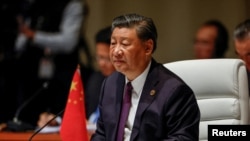Analysts say that when the G20 summit kicks off in New Dehli Saturday, the absence of China’s leader Xi Jinping is likely to overshadow efforts to address pressing global issues such as climate change and Russia’s war in Ukraine.
Beijing has said little about why Xi will be absent. In a one-sentence notice on its website Monday, China’s Foreign Ministry announced that Premier Li Qiang would attend instead. At a press briefing later that day, ministry spokeswoman Mao Ning had little to add, only that, “China has all along attached great importance to and taken an active part in G20 events.”
Analysts say that Xi’s decision to skip the meeting raises questions and highlights the shifting priorities of Beijing’s foreign policy agenda. For starters, they say, not attending will mean missing out on opportunities to engage with other world leaders at the highest level and improve relations.
“China wants to be a leader in global diplomacy, but Xi’s absence contradicts that image,” Moritz Rudolf, a fellow at Yale Law School’s Paul Tsai China Center, told VOA in a phone interview.
Rudolf said the decision also reflects the shifting focus of China’s foreign policy agenda, which prioritizes engagement with developing countries.
“[From] the BRICS Summit and other diplomatic events, including the China-Central Asia Summit in May and Xi’s trip to the Middle East, we can try to derive the priority for China’s foreign policy,” Rudolf said, adding that the focus is on the Global South.
“The priority of China’s foreign policy is not at the G20 Summit as it’s not the forum where China could benefit that much from. It’s easier for them to prioritize the upcoming Belt and Road Forum, where they will mark the 10th anniversary,” he added.
China hosts the 10th anniversary of the forum in Beijing next month.
Close friends first
Since coming to power more than a decade ago, Xi has not missed a single G20 summit. This year, despite China's lifting of tight COVID-19 restrictions and the beginning of his norm-breaking third term in office, his travel overseas has been reduced significantly.
So far, Xi has only left China twice – once to travel to Moscow to meet with Russian President Vladimir Putin in March and more recently to attend the BRICS Summit in South Africa. Both are viewed as countries friendly to China.
“For Xi to visit a certain country, even for [attending] a multilateral forum, it still requires a relatively positive bilateral relationship [between China and the host country,]” Yun Sun, director of the China program at the Stimson Center, a think tank based in Washington, told VOA in a phone interview.
Some examples that reflect this tradition include Xi’s attendance at the G20 Summit in Indonesia and his participation in the APEC Summit in Thailand in 2022.
“These are countries that China has relatively good relationships with, so I’m not surprised that Xi is skipping the G20 Summit in India,” she added.
Sun and other analysts say they think the unresolved tensions between China and India contributed to Xi skipping the G20 Summit.
“In the Chinese view, India is not working with China,” Sun said. “China has been complaining that India is using G20 and its related meetings to assert its claims over disputed territory.”
While China and India have held a series of dialogues aimed at resolving the longstanding border disputes, a new map released by Beijing last week that showed China’s claim to the disputed territories, prompted New Delhi to lodge a diplomatic protest.
Apart from the persistent tension with India, other analysts think the U.S.-led efforts to counter China and Washington’s recent military support for Taiwan may have also contributed to Xi’s decision to skip the G20 Summit.
“Biden’s visit to India and Vietnam is viewed as an effort to encircle China in Beijing, and Beijing is alarmed by Washington’s stepped-up military aid for Taiwan,” Zhiqun Zhu, an expert on Chinese foreign policy at Bucknell University, told VOA in a emailed response.
APEC next?
Reaction to Xi’s decision to skip the G20 Summit from world leaders has been mixed, with U.S. President Joe Biden expressing disappointment with the news and Indian Foreign Minister Subrahmanyam Jaishankar noting that Xi’s absence won’t affect G20 leaders’ efforts to produce a communique.
Although some observers say it will be a missed opportunity, others think China’s decision to not engage with certain countries is part of an effort to get them to change their behavior.
“For example, if the goal is to change the U.S. behavior, some would say the fact that Washington has sent four Cabinet members to Beijing since June is a good sign that the Chinese strategy is working,” Sun from the Stimson Center told VOA in a phone interview.
Whether or not the approach will also be applied to the APEC Leaders Summit, which Washington is hosting in San Francisco, remains to be seen.
Discussions for a potential meeting on the sidelines of the summit in November are still in the works. Sun said Xi’s participation may be affected by Washington’s decision on whether to allow Hong Kong Chief Executive John Lee to take part in the event.
The Washington Post reported in July that the White House had decided to bar Lee from attending the summit. “If John Lee is denied a visa, the Chinese will see this as a major loss of face,” Sun said.
With around two months left until the APEC Summit, Sun said an important indicator of Xi’s pending participation is whether Chinese Foreign Minister Wang Yi makes a trip to Washington to pave the way for the occasion.
“if Wang goes to Washington, that’s a strong signal that Xi will attend the APEC Summit,” she said.




